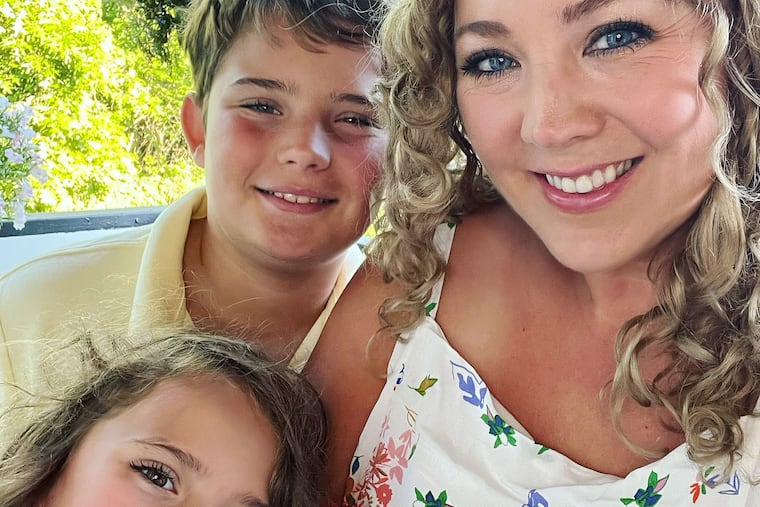‘Superbugs’ are a constant fear for parents like me
My daughter has cystic fibrosis, and no matter how much we clean, she still gets sick. One of the many questions that keep me up at night is: What if, one day, the antibiotics don’t work?

When my husband and I were daydreaming about our second child — our little spitfire, Madelynn — I thought our biggest problems were going to be balancing the challenges of caring for a newborn along with keeping her sweet older brother happy. The day she was born in 2015 was one of the happiest of our lives; our family was complete, and everything felt right.
Then, when she was 7 days old, we got a call from our pediatrician that changed everything forever.
We were told that her newborn screen was flagged for possible cystic fibrosis. In that instant, something was set in motion that became so much more.
Much as we try not to think about it, cystic fibrosis is a terminal, life-shortening disease; the average person born with the disease lives until just 46. In this way, it steals time — and not just years. Every day, it steals hours away from our lives — time for doctor’s visits, tests, nebulizer treatments … and the cleaning. The cleaning is endless.
Bacteria is present everywhere — in water, on toys, even in dirt. Most of it isn’t harmful to you and me, but to someone with cystic fibrosis, a bacterial infection can be lethal. So everything must be cleaned and sterilized after every use. Everything, every time. When she attends school, she takes several handwashing breaks and never uses the water fountains.
But of course, no matter how much we clean, something always sneaks past us, and Madelynn gets sick. A simple cold will trigger the need for an antibiotic treatment to protect Madelynn from further lung damage. Over the past seven years, we’ve been in and out of the hospital, watching our daughter receive IV antibiotics. Thankfully, they’ve always worked.
But one of the many questions that keep me up at night is: What if, one day, the antibiotics don’t work?
It’s not an irrational fear. Every year in the U.S., bacteria that are resistant to antibiotics cause nearly three million infections, which end up killing tens of thousands of people — roughly one person every 15 minutes, according to the Centers for Disease Control and Prevention.
Now that the world is becoming more resistant to antibiotics, I fear that a “superbug” could possibly cost us her life.
“I fear that a ‘superbug’ could possibly cost us her life.”
One of the problems with antimicrobial resistance is that it’s not on many people’s radars. We tend to think of drugs like penicillin or amoxicillin as wars that have already been won in the fight against deadly disease. You get an infection, take an antibiotic, and the problem is solved. But what happens if the antibiotic doesn’t work?
Antimicrobial resistance is an even bigger threat outside of the U.S., where it is now one of the leading causes of death worldwide. In 2019, antimicrobial resistance was linked to nearly five million deaths worldwide, much more than malaria and HIV combined. These numbers are astounding.
What the world needs is new antibiotics, to which our existing bugs are not resistant. While prescribers tackle the problem of overusing antibiotics, which can encourage the growth of resistant bugs, scientists can work to discover new drugs. In June 2021, federal legislation was introduced to help spur this desperately needed research and development. The Pioneering Antimicrobial Subscriptions to End Upsurging Resistance (PASTEUR) Act makes a strategic investment in addressing antimicrobial resistance, encouraging development of necessary, lifesaving medicines. The hope is that patients like my daughter will always have an antibiotic that works.
» READ MORE: Dangerous ‘superbugs’ on the rise, new CDC report says
A world without antibiotics — where an easily treated infection like pneumonia or strep throat becomes deadly — would catapult us back into the dark ages of modern medicine. It would give everyone a taste of the reality that I live in every day.
A simple antibiotic can save infinite lives. Complacency will not.
I urge our lawmakers at the federal level to prioritize this legislation — not just for me and my family, but for the millions of people out there who would be lost if it wasn’t for this lifesaving treatment.
In the meantime, my family and I will keep cleaning, and hoping that whatever infection Madelynn acquires next can be treated with existing antibiotics.
Rebekah Farley is a resident of West Chester. She has been advocating for cystic fibrosis patients for nearly a decade and works with The Bonnell Foundation: Living with Cystic Fibrosis, a nonprofit.